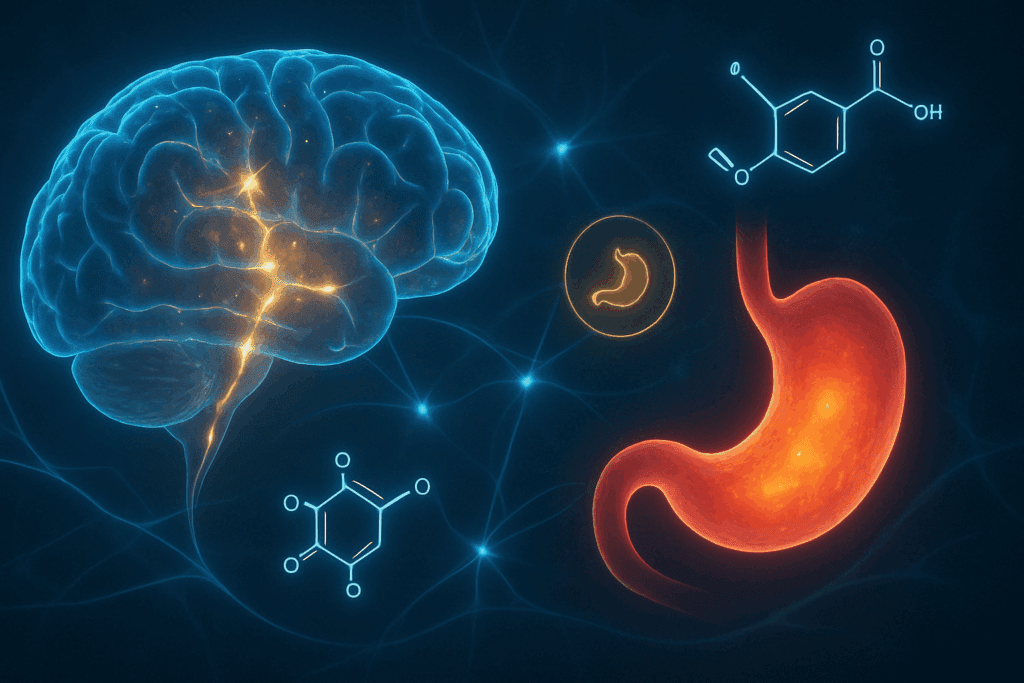Hunger is one of the most primal human instincts, yet in a modern world full of abundance, it often becomes a complex and emotionally driven experience. While our bodies are designed to signal hunger when we need nourishment, today’s eating habits are increasingly influenced by emotional triggers, processed foods, and erratic schedules. This makes learning how to curb your appetite naturally not only a matter of health, but a vital skill for long-term wellness. For individuals seeking sustainable strategies to stop feeling hungry without overeating, the solution lies not in deprivation, but in education and balance. Understanding how to suppress hunger without eating excessively or relying on fad diets can empower people to make choices that support both their nutritional and emotional needs.
You may also like: How to Stop Emotional Eating and Regain Control: Mindful Nutrition Strategies That Support a Healthier Lifestyle

The Science Behind Hunger and Appetite
To effectively manage appetite, it’s crucial to understand what drives hunger in the first place. True physical hunger is regulated by complex hormonal interactions, primarily involving ghrelin and leptin. Ghrelin, often called the “hunger hormone,” signals your brain when it’s time to eat, while leptin informs the body when it’s had enough. These hormones interact with neurotransmitters like dopamine and serotonin, which are also tied to mood and satisfaction. When this delicate balance is disrupted—due to poor sleep, chronic stress, or nutrient deficiencies—the sensation of hunger can become distorted.
In contrast to physical hunger, emotional hunger stems from psychological factors such as stress, sadness, boredom, or anxiety. This is where the concept of “eating my feelings” or “comfort eating” enters the picture. Emotional eating therapy seeks to address the root causes of this behavior, helping individuals identify triggers and develop healthier coping strategies. Differentiating between true hunger and emotional cravings is a key step in learning how to not feel hungry all the time.

Foods That Naturally Reduce Hunger
One of the most effective and sustainable ways to manage appetite is by incorporating foods that reduce appetite into your daily meals. High-fiber foods such as legumes, oats, flaxseeds, and vegetables take longer to digest, creating a lasting sense of fullness. Protein-rich options like eggs, Greek yogurt, lean meats, and tofu also contribute significantly to satiety, making it easier to stop appetite spikes throughout the day. Healthy fats—including avocados, nuts, seeds, and olive oil—play a role in slowing digestion and regulating hunger hormones.
Beyond macronutrients, hydration can have a powerful effect on appetite regulation. Sometimes, the body misinterprets thirst as hunger, leading people to eat when what they truly need is water. Starting the day with a glass of water and sipping consistently throughout can be a subtle but effective way to suppress hunger without eating extra calories. Herbal teas such as peppermint or green tea have also been shown to help diminish appetite, providing a soothing ritual that replaces snacking urges.

Behavioral Approaches to Curb Appetite
Habits and behaviors often influence hunger far more than we realize. One strategy is to eat mindfully, which involves slowing down during meals, paying attention to flavors and textures, and tuning into the body’s satiety signals. This not only supports digestion but also reduces the likelihood of overeating. Mindful eating helps individuals reestablish a connection with their natural hunger cues, teaching them how to stop feeling hungry all the time by aligning eating with true physical needs.
Meal timing can also be an important factor. Eating smaller, balanced meals every 3–4 hours can stabilize blood sugar levels, helping prevent the intense hunger that leads to bingeing. Skipping meals, on the other hand, often backfires, triggering strong appetite responses later on. Understanding how long it takes for your appetite to shrink is also key—it doesn’t happen overnight, but with consistent habits, the body begins to adjust. Incorporating these behavioral shifts provides sustainable ways to suppress appetite that go beyond short-term fixes.
Emotional Awareness and Appetite Control
Emotions play a pivotal role in our perception of hunger. Sadness, anxiety, or chronic stress can lead to a pattern of sad eating or emotional snacking, where food becomes a coping mechanism rather than a source of nourishment. This is particularly common during times of emotional turmoil or after a long day, when fatigue lowers emotional resilience. Learning how to prevent myself from eating in these moments often starts with developing greater emotional awareness.
Alternatives to stress eating include engaging in physical activity, journaling, or reaching out to a friend. Deep breathing exercises and mindfulness meditation are also powerful tools that help regulate the nervous system, reducing the emotional intensity that often drives hunger. When practiced consistently, these techniques create space between emotion and action, making it easier to make thoughtful decisions about food. Understanding how to stop hunger pains that stem from emotional rather than physical triggers is a transformative skill in appetite control.

How to Decrease Appetite Naturally Through Lifestyle Choices
Beyond food and emotions, lifestyle factors can influence how we experience hunger. Sleep, for example, has a profound impact on appetite regulation. Inadequate or poor-quality sleep increases ghrelin while suppressing leptin, leading to heightened hunger the following day. Prioritizing 7–9 hours of quality sleep each night is therefore a cornerstone in learning how to curb appetite naturally.
Physical activity is another key element. While intense exercise may temporarily increase hunger, moderate and consistent movement helps regulate metabolism, reduce stress, and enhance insulin sensitivity. Activities like walking, swimming, or cycling can make you feel energized rather than ravenous. This balance helps the body understand how to suppress hunger without eating excessively afterward. Reducing screen time and practicing digital mindfulness can also indirectly support better appetite control by minimizing distractions and improving sleep hygiene.
How to Make Yourself Not Be Hungry With Nutritional Strategies
Strategic meal planning plays a major role in reducing feelings of hunger. Creating meals that balance protein, fiber, and healthy fats helps maintain steady energy and satisfaction. Instead of reaching for processed snacks, preparing whole food alternatives ensures that what you eat contributes to fullness rather than quick cravings. For instance, swapping chips for roasted chickpeas or fruit with nut butter provides sustained satiety.
Portion control is equally important. Even healthy foods can lead to overeating if consumed mindlessly. Using smaller plates, pausing between servings, and checking in with your body before going back for more can help diminish appetite naturally. Learning how to stop appetite through balanced, intentional eating often requires practice and self-compassion. It’s not about restriction, but about nourishing the body in a way that promotes clarity and energy.

Natural Supplements and Plant-Based Support
While no pill can replace healthy habits, some natural supplements may assist in appetite regulation. Fiber-based supplements like glucomannan swell in the stomach and slow digestion, helping reduce hunger. Herbal remedies such as fenugreek, gymnema sylvestre, and garcinia cambogia have also been studied for their potential effects on satiety and sugar cravings. That said, the use of any supplement should be discussed with a healthcare provider to ensure it aligns with your individual needs.
Adaptogenic herbs like ashwagandha and rhodiola can support the body’s response to stress, indirectly helping those who struggle with comfort eating. For those exploring how to stop feeling hungry without eating excessively, these natural tools can provide a gentle layer of support when used as part of a broader wellness plan. However, it’s essential to remember that supplements are enhancements—not solutions—and they are most effective when paired with nutritional and behavioral strategies.
Understanding How to Stop Appetite Naturally With Psychological Tools
Cognitive and behavioral psychology offers additional insights into appetite control. Techniques like cognitive restructuring help identify and challenge unhelpful thought patterns that lead to overeating. For instance, the belief that “I must eat to feel better” can be replaced with “I can meet my emotional needs in other ways.” This shift supports efforts to quit emotional eating and develop a healthier relationship with food.
Habit tracking and journaling are other valuable tools. Writing down when and why you feel hungry can reveal patterns and help distinguish between physical hunger and emotional cravings. Over time, these insights make it easier to identify the things that make you unhungry in a sustainable, non-restrictive way. Developing awareness around your unique triggers and responses supports long-term change.

Creating a Long-Term Plan to Reduce Appetite and Support Wellness
Sustainable appetite management doesn’t come from quick fixes. It requires consistent, intentional habits rooted in understanding and self-respect. One of the most overlooked aspects of how to reduce appetite is patience. The body and brain both need time to adjust to new routines, especially if emotional eating patterns have been in place for years. This process involves building resilience, flexibility, and trust in your ability to meet your needs without relying on food as a primary coping tool.
Setting realistic goals is an important starting point. Instead of aiming to eliminate hunger altogether—a biologically impossible and unhealthy goal—focus on learning how to stop feeling hungry all the time in ways that support your energy, focus, and mood. Tracking your progress and celebrating small wins along the way reinforces motivation and self-efficacy. Surrounding yourself with supportive environments and like-minded individuals can also make the journey more manageable and rewarding.
Frequently Asked Questions: Natural Ways to Curb Appetite
1. Can mental stimulation help reduce appetite without food? Absolutely. Engaging in mentally stimulating activities, such as solving puzzles, learning a new skill, or even diving into an engaging book, can redirect your attention away from hunger cues. This is especially effective when you’re looking for how to suppress hunger without eating, as the brain’s cognitive engagement can sometimes override unnecessary hunger signals. These moments of focused concentration also help rewire the reward circuitry that often drives emotional cravings. While not a long-term fix for true hunger, these strategies serve as excellent ways to suppress appetite in moments of boredom or emotional vulnerability.
2. Are there cultural or traditional remedies that help diminish appetite? Across different cultures, various practices have been used for centuries to curb appetite naturally. For example, Ayurvedic medicine recommends sipping warm lemon water with ginger as a pre-meal ritual to balance digestion and reduce overeating. In Traditional Chinese Medicine, bitter herbs like gentian are used to create early satiety by stimulating digestion and altering taste perception. Exploring these natural ways to reduce hunger can provide complementary strategies alongside modern nutritional science. These remedies demonstrate that understanding how to stop appetite isn’t a new challenge—it’s just one that has evolved over time.
3. How can scent influence feelings of hunger or fullness? Surprisingly, certain aromas have been shown to reduce appetite by influencing the hypothalamus, the part of the brain that regulates hunger. Scents like peppermint, green apple, and vanilla may decrease cravings and help individuals feel more satisfied. This lesser-known sensory trick can be one of the more unique ways to curb appetite without food. Using essential oils or naturally scented candles during high-craving periods may offer a helpful tool when considering how to stop feeling hungry all the time. While scent isn’t a substitute for balanced meals, it supports an environment conducive to mindful eating.
4. What role does gut microbiota play in appetite regulation? Emerging research shows that your gut microbiome can directly impact hunger cues and the desire for specific foods. A well-balanced gut flora produces short-chain fatty acids and other compounds that influence hormones involved in satiety. Fermented foods, prebiotics, and diverse plant-based diets support the gut’s ability to help diminish appetite and regulate mood. This means improving gut health may be an essential part of learning how to curb appetite naturally. Scientists are increasingly exploring probiotics as part of broader interventions for how to reduce appetite and manage weight long-term.
5. Is cold exposure effective for suppressing hunger? While still being researched, short-term cold exposure—such as cold showers or brief outdoor walks in cool weather—may stimulate the release of norepinephrine and activate brown fat, potentially reducing appetite temporarily. This response may serve as a physiological way to make yourself not be hungry in moments of intense cravings. However, this method should be approached with caution, particularly for individuals with medical conditions. While not a standalone solution, it may complement natural ways to curb appetite when combined with proper nutrition and stress management. It’s another reminder of the diverse tools available when seeking out things that make you unhungry.
6. Can structured routines influence appetite regulation? Yes, having a consistent daily routine helps stabilize hormonal fluctuations that govern hunger. When meals, sleep, and activity are scheduled regularly, the body’s internal clock—or circadian rhythm—functions more efficiently, reducing erratic appetite spikes. People often discover that regular structure becomes one of the most sustainable ways to suppress appetite over time. This approach is particularly useful for those wondering how to not feel hungry in the late evening, a common trigger period for emotional eating. Building structure around mealtimes also helps diminish appetite naturally by reinforcing predictable eating habits.
7. How can creative expression serve as an alternative to stress eating? Creative outlets such as painting, music, dance, or even cooking (without tasting excessively) can channel emotional energy away from food. These practices provide psychological fulfillment and often fulfill the emotional void that triggers eating my feelings. For those exploring alternatives to stress eating, self-expression can be deeply nourishing on a non-physical level. Over time, these activities help reduce reliance on food as emotional regulation, offering a different path for how to prevent myself from eating during difficult moments. They also support emotional eating therapy by helping individuals explore their inner world constructively.
8. What is the long-term timeline for shrinking appetite naturally? The question of how long it takes for your appetite to shrink depends heavily on individual metabolic factors, dietary changes, and emotional resilience. Most people experience noticeable changes in appetite regulation after 2–4 weeks of consistent nutritional habits, especially when incorporating high-fiber foods and proteins. However, emotional triggers and ingrained habits may take longer to shift. Learning how to stop hunger pains without relying on snacks involves both physiological adaptation and psychological growth. With time, intentional behaviors become habits, leading to sustainable, natural ways to reduce hunger over the long haul.
9. How can social environments influence our ability to stop feeling hungry? Human behavior is socially influenced, and eating is no exception. Being around people who frequently snack or overeat can make it more challenging to follow through on plans for how to decrease appetite or quit emotional eating. On the other hand, surrounding yourself with mindful eaters or those who value wellness can positively influence behavior. Engaging in social activities that don’t revolve around food—such as walking groups or book clubs—can offer things that curb appetite by redirecting your focus. Social accountability can enhance motivation, especially when figuring out how to stop appetite naturally in a way that fits your lifestyle.
10. Are there psychological strategies to reframe food-related thoughts? Cognitive reframing is an evidence-based approach that helps individuals change the way they interpret hunger cues and food cravings. Instead of viewing hunger as an emergency, it can be reframed as a signal that invites curiosity: Is this physical hunger or something else? Practicing this distinction helps in identifying effective ways to curb appetite while developing a healthier relationship with food. Thought journaling and mindfulness-based interventions support this process and are often integrated into emotional eating therapy programs. For many, reframing offers an internal dialogue that aligns with long-term strategies for how to stop feeling hungry without eating impulsively.
Final Thoughts on How to Curb Appetite Naturally Without Overeating
In a world where food is readily accessible and emotional challenges are often met with a snack, learning how to stop appetite naturally is both an art and a science. It requires understanding the physiological drivers of hunger, distinguishing them from emotional triggers, and cultivating daily habits that nourish the body and calm the mind. From choosing foods that curb your hunger to discovering things that make you unhungry, every step taken toward mindful eating and emotional resilience adds up to a healthier, more empowered life.
Ultimately, natural ways to reduce hunger are not about suppression in the traditional sense—they are about alignment. When our eating habits reflect our true physical needs and emotional health, we no longer need to ask how to make yourself not be hungry or how to prevent myself from eating out of stress or sadness. Instead, we develop the wisdom to nourish our bodies and the compassion to support our minds, one mindful bite at a time.
Was this article helpful? Don’t let it stop with you. Share it right now with someone who needs to see it—whether it’s a friend, a colleague, or your whole network. And if staying ahead on this topic matters to you, subscribe to this publication for the most up-to-date information. You’ll get the latest insights delivered straight to you—no searching, no missing out.
Further Reading:
Top 10 Ways to Deal With Hunger

